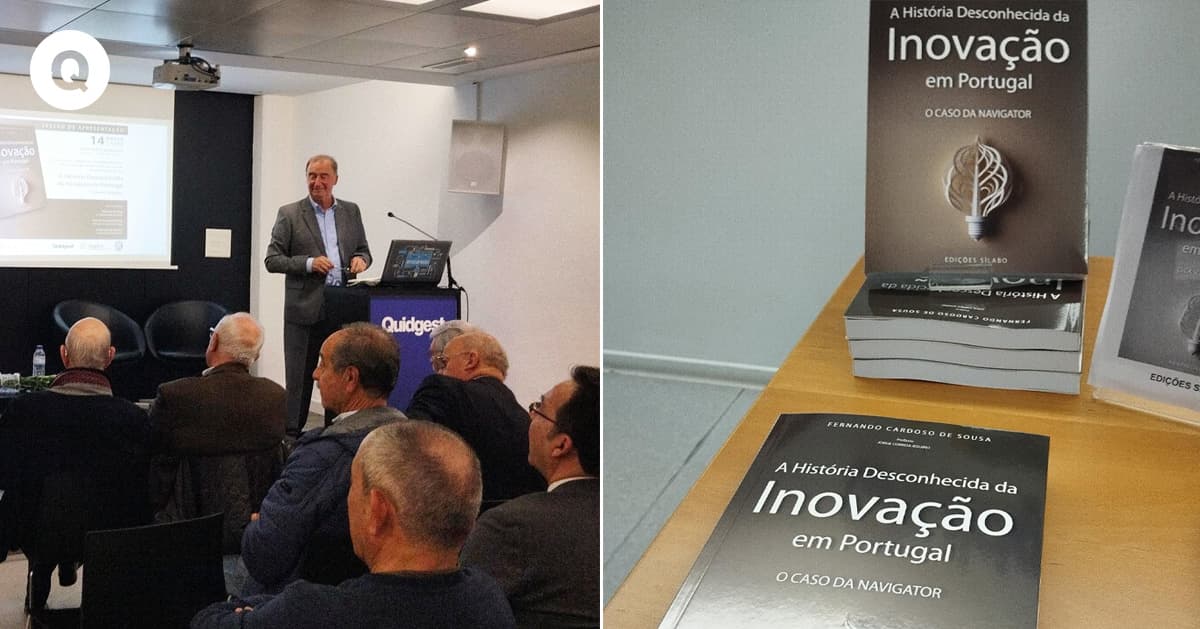Book launch: “A História desconhecida da Inovação em Portugal — o caso da Navigator”
It was with great pleasure that we hosted, on March 14th, at the Quidgest facilities, the launch of the book “A História desconhecida da Inovação em Portugal—o caso da Navigator” by Fernando Cardoso de Sousa, President of the Board of the Portuguese Association for Creativity and Innovation (APGICO), founder and CEO of Quinta dos Novos Canastros, and Ph.D. in Organizational Psychology from ISCTE.
A meeting point for family and long-time friends, the session was graced by the presence of distinguished speakers, who made it a point to dedicate a few words to both the book and its author:
João Paulo Carvalho, Co-founder of Quidgest, was the first to take the stage to express his enthusiasm and welcome the participants. In his opening speech, he mentioned that it is “an extremely interesting work, very pleasant to read” and that it will certainly “be the subject of constructive debate for everyone.”
Joana Robalo, representative of Edições Sílabo, left a very special thank you to Fernando Cardoso de Sousa, for trusting the publisher to realize what is their fourth joint editorial project. “Our collaboration (since 2010) leaves us very satisfied, as we are publishing works deeply anchored in Portuguese reality, strengthening us and being yet another contribution to the achievement of our mission, which is to promote and support the assertion of Portuguese thought.”
Manuel Gil Mata, Former Administrator of Navigator, began by explaining that, although “the paper industry is not known as a highly innovative industry”, the truth is that this book proves the opposite. One of the examples cited was the processing of eucalyptus wood to produce pulp and paper fiber through the so-called sulfate pulp production method, carried out for the first time in Portugal (Navigator’s Cacia factory), still during post-war industrial development leveraged by the Marshall Plan. Manuel Gil Mata mentioned what started as a machinery problem turned out to be an opportunity for disruption, a turning point in the paper industry – and an inspiration for Fernando Cardoso de Sousa’s book.
Orlindo Gouveia Pereira, Emeritus Professor of Psychology, congratulated the book’s theme and took the opportunity to delve into the roots of the word ‘innovation,’ explaining: “25 centuries ago, in Athens, there was a large square (as there was in all Greek cities) where wisdom from Philosophy was discussed. And when aspiring philosophers arrived at the square (agora), they asked – ‘what’s new?’. It is here that our civilization and culture of novelty lies. Innovate comes from Latin and the Indo-European root, ‘newo’, which means new (…). To innovate is the act of introducing something that appears for the first time. And an innovator is the person who introduces novelties, changes, inventions in a given domain.”
Jorge Correia Jesuíno, Emeritus Professor at ISCTE, spoke of the university times shared with Fernando Cardoso de Sousa at ISPA, and also shared: “Within Psychology, Fernando ventured into a theme, a theme that scared us a lot, which was precisely the theme of innovation. He never gave up on investing and researching in this area (…), And he himself sets the example of what it means to be innovative. Not only in writing – but also in the field of Tourism since he took advantage of ancient archaeology (the granaries where cereals were stored, the ‘canastros’) and transformed it into a hospitality project, but at the same time, a project archaeologically related to our Portuguese History.”
Visibly moved after several tributes and his grandchildren’s entrance on stage, Fernando Cardoso de Sousa took the floor to thank everyone for their presence, thank Quidgest for providing the facilities for this event, and thank the collaboration of those who helped make this book possible, contributing through interviews, testimonies, accurate and precise historical framing, and revision, among other things.
In a farewell note, the author left the following message: “It’s not fun to write a book if it’s not for someone to read it. Not that you do it, as I’ve said, I strongly advise against it (laughs). But it means, you represent my satisfaction of being able to do something, even if it’s the possibility of being here in a session with the importance of the speakers who preceded me. Just that. And since you are people of the most diverse origins, interests, and backgrounds, gathering in a synthesis that may, in some way, have to do with the book is, for me, a source of pleasure. And that’s enough for me. You don’t have to buy the book. It was enough that you came here.”
* To buy or learn more about the book “A História desconhecida da Inovação em Portugal – o caso da Navigator”, click here.



